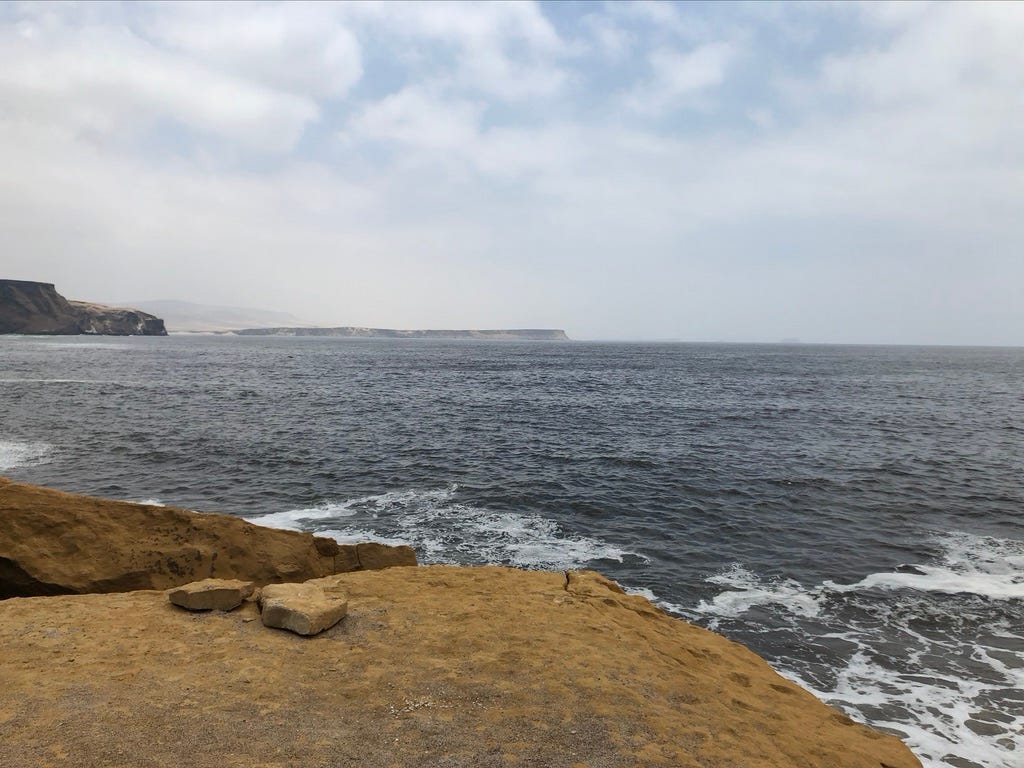Just Out Of Sight The Ocean Rises Up And Collapses
We have never been prepared for disasters of any kind
A few years ago, when this newsletter was in its infancy, I wrote about how I think teenagers mostly get a bum rap when adults accuse them of being checked out, uncaring, self-absorbed. I said this not just as a Former Teenager myself, but as someone who spends a lot of time with them in my role as a GED instructor.
The example I used back then to illustrate the ignorance of people who think teenagers don’t care about stuff was that of The Really Big One: the cataclysmic earthquake that is, by our best estimates, overdue to strike the Pacific Northwest. When it comes, it will destroy life as we know it west of the Cascades. Every year, I teach excerpts of the piece that made the world aware this disaster is coming; every year, I get to witness these “self-absorbed” young people respond to it with more empathy, fear, concern, and bravery than their critics could possibly imagine.1
Just…not this year. I have spent the last three weeks teaching this same story, working with my students to analyze the maps and graphs and primary source documents and investigative techniques that help us understand it. I reworked my curriculum to make it more interactive, more closely matched with the specific question types the GED tests prioritize, more inclusive of perspectives on the issue that aren’t white and western. And for all that effort, I have gotten basically zilch. No outward moments of revelation, no gasps, no tears, no passionate outbursts about how insane the very notion of an earthquake is. Nada.
Here, again, you would be a fool to pin this lack of output on the Teenage Mind. They’re just totally burned out, man. Cooked. Sick of being asked to comprehend the horrors of a few thousand more of their neighbors being killed by something they have no control over.2 And probably just as sick of having to try to learn over Zoom.
“Remote learning” is beginning to feel like an oxymoron, frankly. If there is anyone out there doing this well, I’d love to hear from them. It’s just not happening for us. On most of the days that I teach remotely—which is all of them so far this month, after I requested and was granted that option for the month of January—I see no face but my own, just a sea of black boxes with white names. I hear no voice but my own, just messages in a chat bar, except for the once every week or so when a student asks to go into a breakout room with me so they can melt down completely.3 My remote classroom has become a crude facsimile of schooling, nothing more.
But.
I still believe the decision to make my class remote for the first month of the quarter was the right one. Teaching remotely is a maddening, quixotic exercise, but the alternative was pretty obviously worse. It was not a hard call to prioritize, for example, the student with a parent whose chemotherapy has left them immunocompromised over my own desire to be in front of a real classroom. It was not even a hard call to prioritize the health of my few students who are proudly unvaccinated, victims of bad information designed to flatter and terrify them in equal measure, over the learning gains of their peers. They don’t deserve to die from this, either.
It is almost trite, at this point, to discuss COVID deaths in terms of us having accepted a 9/11’s worth of casualties each day. I think we wore out that comparison during that stretch of time where there were so many 9/11s per day that it stopped being a useful point of comparison. But more than 2,900 Americans died of COVID a week ago today, so. A thing being trite does not make it less correct.
There are plenty of people out there who will point to examples like mine and proclaim them proof of the selfishness of teachers, the irrationality of the cowed and fearful, the looniness of the Left or whatever. Serious Thinkers who launder the reputations of policymakers, like Emily Oster and Ashish Jha, will continue to feign concern for The Children as they advocate for the majority position—“end the madness of the tyrannical lockdown and open things back up!”—while pretending a) that this is somehow brave and heterodox truth-telling and b) that there is any semblance of lockdown occuring right here in the United States today. To freaks like these the only real problem is the group of people who don’t want America’s status as the world’s premier charnel house to continue for a third full year.
Here’s Alex Pareene on this same issue:
…Disney World was officially full on New Year’s Eve. For $107 I could book a flight to Bermuda this weekend. The Knicks lost at home yesterday; a fan was spotted at the game watching The Office on mute…The number one movie in the country is Scream.
…And yet! To hear some people, this is a country where panicky scolds refuse to allow children to go back to school, or, in some vague sense, let people have their normal lives back.
But, with a couple exceptions, [people] with legitimate complaints about what the unchecked spread of the virus has done to their lives, aren’t really the ones you actually see complaining so goddamn much, because most of those sorts of people don’t have the sorts of platforms that would lead me to come across their complaints. It is very much mainly people in households very much like mine (or ones that have it even easier!) that are the primary sources of the most well-publicized opining on how This Has Gone On Long Enough and It’s Time For the Democrats to Say Enough Is Enough and Make It Stop.
To the extent that I can understand and empathize with the Freedom crowd, it is along these lines: it is true that we each have but one wild and precious life to live, and to have years, plural, of that life taken from us—no gatherings, no friends, no control in many respects over what we are allowed to do—is an existential tragedy. We have not just contemplated it, we have lived it, and the enraged reaction to that loss of control does make sense to me on some level.
But the cruel irony is that in discovering this one essential truth, this group of people has missed equally essential—and inextricable—others. That our lives are socially constructed, and that whether or not we were asked to sign the social contract, we owe each other an immeasurable amount. That despite what we have learned across several centuries of capitalism and several decades of neoliberalism, none of us are gods, and the civic religion to which millions of us belong—the worship of the self as the sole unit of the divine—is not just incorrect, but world-endingly destructive. We here in America are prophets of an apocalyptic cult that each person believes has just one member.
I think of what a rich freedom we have all been denied by our refusal to understand that our liberation is bound up in one another’s.
But I also know that to focus my ire exclusively, or even predominantly, on regular people4 who adopt this line that we need to “end the madness and get back to normal” is to miss the point entirely. To continue to believe that if only more people acted a little better, we’d get out of this thing is to let the perpetrators of a world-historic crime off scot-free.
This isn’t to say that I am not, on a personal level, pissed off at the bozos who proudly and nakedly flaunt the few limited, common-sense restrictions that are in place anywhere. I am. But it is not the dumbasses I forgot to mute on Facebook responsible for the complete and utter failure of our government to provide enough economic relief to let people stay home instead of being forced to go to work. It is not your ignorant coworker’s fault that our government, aided by the influential lobbying of people like Bill Gates, has fought aggressively to maintain strict IP rights for American pharmaceutical companies, which has had the consequence of denying billions of people worldwide access to basic protection against COVID. It is not the tanned and leathery owners of Debbie & Shooter’s Bar and Grill in one of those Illinois towns that’s just a series of strip malls who are using the most reputable publications in the country to propagandize people into dying for the sake of making a line on an imaginary economic graph go up.
I confess that at this point I’m at a total loss as to what any of us is supposed to do about all of this. Next week I will go back into the classroom, and I will probably spend as much time reviewing our school’s COVID policies and daily wellness self-check and mask requirements as I will actually delivering instruction. Despite all that, and although it’s probably hypocritical, I’m as excited as I am nervous, because I will be returning to something closer to “normal” than whatever all this I’m coping with now is.
Thanks, as always, for reading. I’ll talk to you next week.
-Chuck
PS - If you liked what you read here, why not subscribe and get this newsletter delivered to your inbox each week? It’s free and always will be, although there is also a voluntary paid subscription option if you feel like supporting Tabs Open financially.
With the exception of 2020. Felt like the students could use a little break from apocalyptic scenarios back then.
I probably should have seen this coming. In my defense, when I planned this unit, I had just gotten my booster shot, the holiday Omicron wave was months away from coming to bear, and I had foolishly succumbed to something like hope.
The most recent of these was when a student had his Math GED test cancelled by a remote proctor for the twofold offense of “mouthing the words in the questions to himself” and “some stranger ignoring the classroom’s TESTING IN PROGRESS - DO NOT ENTER sign and walking in during the test.”
By this I mean people with no power, with no cushy sinecures at prestige publications or universities, with no sway over the decisions that get made in this country, who collect no paychecks for advancing the party line.






Ultimately I was hoping for more disruption out of this pandemic, but it seems the desire to "return to normal" and not dwell on the past is once again going to overwhelm us here in the States (ironically I am typing this as I just got done teaching Reconstruction).
I constantly tell my students that our country and history is a reflection of our choices and like Charlie Brown and Lucy chasing the football I constantly get tricked into this time we are going to make the right choices and be like the tree network you wrote about last week.
As a fellow teacher (for the next week or two), this is great and does a great job of tackling the complexities that we have had to deal with during the last two years. Thanks!